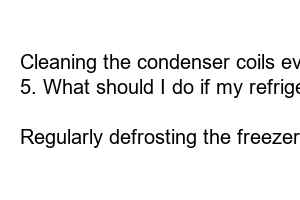냉장고 소음 원인
Title: Common Causes of Noisy Refrigerators and How to Address Them
Introduction:
Refrigerators are essential appliances that keep our food fresh and our beverages cold. However, when they start making strange noises, it can be quite unsettling. In this article, we will explore the common causes of refrigerator noise and provide practical solutions to address them.
1. Vibrations and Loose Components:
A refrigerator comprises numerous moving parts, and if any of them become loose, vibrations may occur, leading to annoying noises. Ensure all components, such as condenser coils, fan blades, and motors, are securely fastened to prevent excessive movements.
2. Damaged or Worn Coils:
Over time, the condenser and evaporator coils of your refrigerator may become damaged or worn out. This can result in unusual noises. Regularly inspect and clean these coils to maintain their functionality and minimize noise production.
3. Clogged or Faulty Fans:
The fans in a refrigerator play a crucial role in circulating cool air. If the fans become clogged with debris or develop faults, they can create rattling or humming sounds. Cleaning the fans and ensuring they are in good working condition can resolve this issue.
4. Malfunctioning Compressor:
The compressor is the heart of a refrigerator, responsible for pressurizing and cooling the refrigerant. If it malfunctions, it may generate buzzing or clicking sounds. Contact a professional technician to diagnose and repair any compressor-related issues.
5. Uneven Refrigerator Placement:
Did you know that the way you place your refrigerator can contribute to noise production? If the appliance is not placed on a level surface, it may vibrate or produce rattling noises. Adjust the leveling feet of your refrigerator to ensure stability and minimize vibrations.
6. Ice Build-Up in the Freezer:
Excessive ice accumulation in the freezer can interfere with the freezer fan’s operation, resulting in a loud noise. Regularly defrosting and cleaning your freezer will prevent ice buildup and maintain optimal functionality.
7. Water Supply Issues:
A malfunctioning water inlet valve or a blocked water line can cause a loud hissing or gurgling noise in some refrigerator models with built-in water dispensers or ice makers. Check the water supply connections and address any issues promptly.
Summary:
A noisy refrigerator can be a nuisance, but it doesn’t necessarily mean you need to replace it. By identifying and addressing the root causes of the noise, such as loose components, damaged coils, faulty fans, or a malfunctioning compressor, you can often restore your appliance to its quiet, efficient state. Additionally, ensuring proper refrigerator placement, preventing ice buildup, and checking water supply connections are crucial in reducing unnecessary noise. Remember, maintenance is key to keeping your refrigerator running smoothly and silently.
FAQs:
1. Can a noisy refrigerator be dangerous?
No, a noisy refrigerator is not typically dangerous. However, it may indicate an underlying issue that needs to be addressed to avoid potential damage to the appliance.
2. Will a noisy refrigerator consume more energy?
While some noise may not directly affect energy consumption, certain issues, like a malfunctioning compressor, can lead to increased energy usage. Therefore, fixing the noise source can indirectly improve energy efficiency.
3. Should I try to repair the refrigerator myself?
It is recommended to contact a professional technician for refrigerator repairs. Attempting to fix the issue on your own without expertise may worsen the problem or pose safety hazards.
4. How often should I clean the condenser coils?
Cleaning the condenser coils every six months is usually sufficient. However, for households with pets or excessive dust, more frequent cleaning may be required.
5. What should I do if my refrigerator is still noisy after addressing the possible causes?
If you have tried the suggested solutions and your refrigerator remains noisy, it is advisable to seek assistance from a qualified technician as there may be an underlying mechanical issue.
6. Is there any way to prevent ice buildup in the freezer?
Regularly defrosting the freezer and keeping the freezer door properly sealed can help prevent ice buildup. Additionally, avoid leaving the freezer door open for extended periods.

